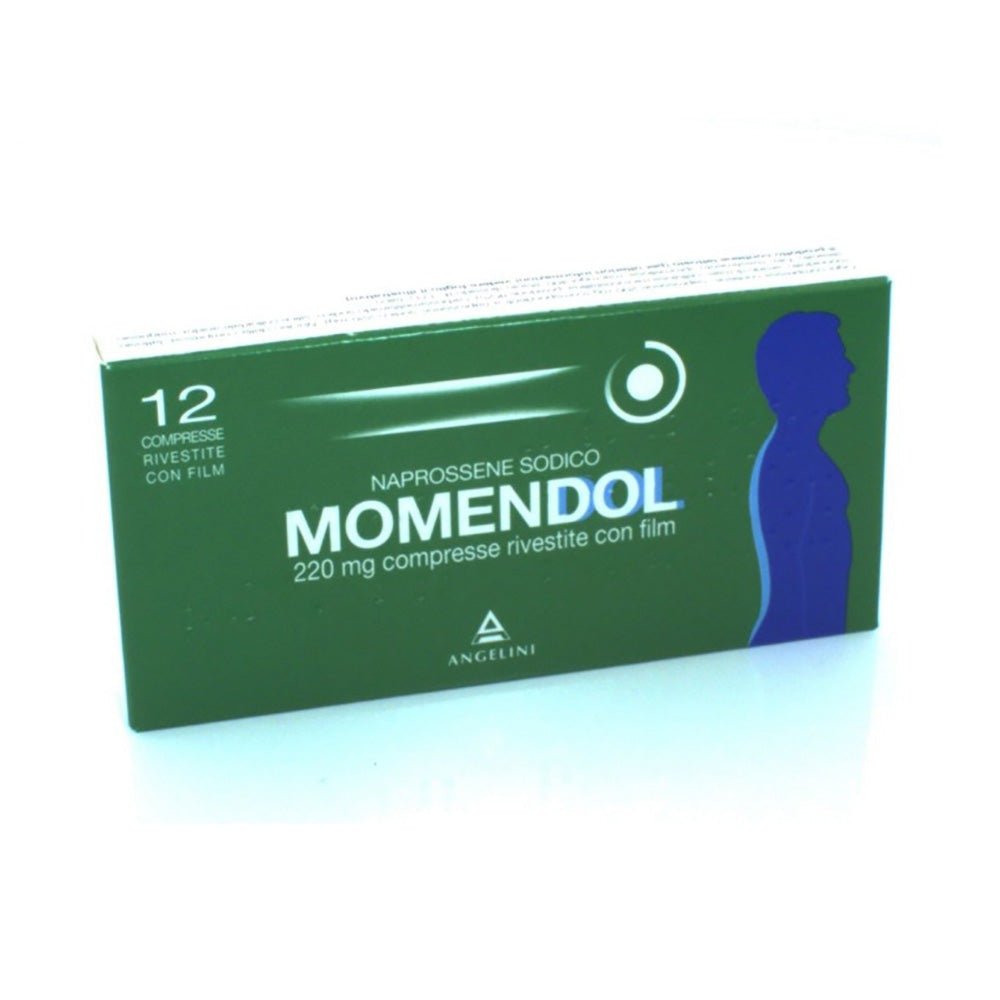
Momendol Tablets is an over-the-counter medicine based on Naproxen which is used in the short-term symptomatic treatment of mild to moderate pain and in the treatment of fever .
Momendol is an anti-inflammatory useful for treating muscle and joint pain, headache, toothache and menstrual pain . Momendol Naproxen 200 mg Anti-inflammatory 12 Tablets also has antipyretic action , useful for controlling temperature and treating flu symptoms .
ACTIVE INGREDIENTS
Active ingredients contained in Momendol 200 mg Anti-inflammatory 12 Coated Tablets - What is the active ingredient of Momendol 200 mg Anti-inflammatory 12 Coated Tablets?
Naproxen 200 mg (corresponding to naproxen sodium 220 mg).
EXCIPIENTS
Composition of Momendol 200 mg Anti-inflammatory 12 Coated Tablets - What does Momendol 200 mg Anti-inflammatory 12 Coated Tablets contain?
Tablet core: lactose monohydrate, maize starch, microcrystalline cellulose, povidone (K25), sodium starch glycolate, colloidal anhydrous silica, magnesium stearate. Film-coating: hypromellose, macrogol 400, titanium dioxide (E171), talc.
DIRECTIONS
Therapeutic indications Momendol 200 mg Anti-inflammatory 12 Coated Tablets - Why is Momendol 200 mg Anti-inflammatory 12 Coated Tablets used? What is it used for?
It is indicated in adults and adolescents over 16 years of age for the short-term symptomatic treatment of mild to moderate pain such as muscle and joint pain, headache, toothache and menstrual pain. It can also be used in the treatment of fever.
CONTRAINDICATIONS SIDE EFFECTS
Contraindications Momendol 200 mg Anti-inflammatory 12 Coated Tablets - When should Momendol 200 mg Anti-inflammatory 12 Coated Tablets not be used?
Hypersensitivity to the active substance or to any of the excipients or to other active substances closely related to naproxen from a chemical point of view. Naproxen is contraindicated in patients with allergic manifestations, such as asthma, urticaria, rhinitis, nasal polyps, angioedema, and anaphylactic or anaphylactoid reactions induced by acetylsalicylic acid, analgesics, nonsteroidal anti-inflammatory drugs (NSAIDs) and/or antirheumatics, due to possible cross-sensitivity. Naproxen is contraindicated in patients with gastrointestinal bleeding or perforation related to previous treatment with nonsteroidal anti-inflammatory drugs, active or previous recurrent peptic ulcer/hemorrhage, chronic inflammatory bowel disease (ulcerative colitis, Crohn's disease), severe hepatic insufficiency, severe cardiac insufficiency, severe renal insufficiency (creatinine clearance < 30 ml/min), angioedema, during intensive therapy with diuretics, and in subjects with active hemorrhage and at risk of hemorrhage during therapy with anticoagulants. - Third trimester of pregnancy and breastfeeding. Contraindicated in children under 12 years.
DOSAGE
Quantity and method of taking Momendol 200 mg Anti-inflammatory 12 Coated Tablets - How to take Momendol 200 mg Anti-inflammatory 12 Coated Tablets?
Adults and adolescents over 16 years: 1 film-coated tablet every 8-12 hours. If necessary, a better effect can be obtained by starting, on the first day, with 2 film-coated tablets followed by 1 film-coated tablet after 8-12 hours. Do not exceed 3 film-coated tablets in 24 hours. Elderly/Renal impairment. Elderly patients and patients with mild or moderate renal impairment should not exceed 2 film-coated tablets in 24 hours. Paediatric population. The drug is contraindicated in children under 12 years. Method of administration. The drug should preferably be taken after a meal. Swallow the tablets whole with water. Do not use for more than 7 days for pain and for more than 3 days for fever. Patients should be advised to consult a doctor if pain and fever persist or worsen.
CONSERVATION
Storage Momendol 200mg Anti-inflammatory 12 Coated Tablets - How to store Momendol 200 mg Anti-inflammatory 12 Coated Tablets?
Store in the original package in order to protect from light and moisture.
WARNINGS
Warnings Momendol 200 mg Anti-inflammatory 12 Coated Tablets - About Momendol 200 mg Anti-inflammatory 12 Coated Tablets it is important to know that:
Undesirable effects may be minimised by using the lowest effective dose for the shortest duration necessary to control symptoms (see gastrointestinal and cardiovascular risks below). Clinical trial and epidemiological data suggest that use of coxibs and some NSAIDs (particularly at high doses and in long term treatment) may be associated with a small increased risk of arterial thrombotic events (for example myocardial infarction or stroke). Although some data suggest that use of naproxen (1000 mg/day) may be associated with a lower risk, some risks cannot be excluded. There are insufficient data on the effects of naproxen at low doses (600 mg/day) to draw definitive conclusions on possible thrombotic risks. There is a close correlation between dosage and the occurrence of severe gastrointestinal undesirable effects. Therefore, the lowest effective dosage should always be used. Caution is required (discuss with your doctor or pharmacist) before starting treatment in patients with a history of hypertension and/or heart failure since fluid retention, hypertension and edema have been reported in association with treatment with NSAIDs. Diuresis and renal function must be carefully monitored, particularly in the elderly, in patients with chronic congestive heart failure or chronic renal failure, in patients treated with diuretics, or following major surgery involving hypovolemia. In patients with severe heart failure, worsening of conditions may occur. Particular caution is advised in patients with a history of gastrointestinal disease or liver failure and in patients with current or previous allergic manifestations, as in these subjects the product may cause bronchospasm, asthma, or other allergic phenomena. If visual disturbances occur, treatment with Momendol must be suspended. In association with the use of NSAIDs, serious skin reactions, some of them fatal, such as exfoliative dermatitis, Stevens-Johnson syndrome, and toxic epidermal necrolysis, have been reported very rarely. Patients appear to be at highest risk early in the course of therapy: the onset of the reaction occurs in the majority of cases within the first month of treatment. Momendol should be discontinued at the first appearance of skin rash, mucosal lesions, or any other sign of hypersensitivity. Naproxen, like any other NSAID, may mask the symptoms of concomitant infectious diseases. In isolated cases, exacerbation of infectious-based inflammation has been reported in temporal connection with the use of NSAIDs (e.g. development of necrotizing fasciitis). Gastrointestinal bleeding, ulceration and perforation, which may be fatal, have been reported at any time during treatment with all NSAIDs, with or without warning symptoms or a previous history of serious gastrointestinal events. The risk of GI bleeding, ulceration or perforation is higher with increasing doses of NSAIDs, in the elderly and in patients with a history of ulcer, particularly if complicated with haemorrhage or perforation. These patients should start treatment on the lowest dose available. The possible concomitant use of protective agents (e.g. misoprostol or proton pump inhibitors) should be considered for these patients, and also for patients taking low dose aspirin or other drugs likely to increase gastrointestinal risk. Patients with a history of GI toxicity, particularly when elderly, should report any unusual GI symptoms (especially GI bleeding) particularly in the initial stages of treatment. Caution should be exercised in patients taking concomitant medications which could increase the risk of ulceration or bleeding, such as oral corticosteroids, anticoagulants such as warfarin, selective serotonin reuptake inhibitors or anti-platelet agents such as aspirin. In patients receiving the drug, treatment should be discontinued if gastrointestinal bleeding or ulceration occurs. NSAIDs should be administered with caution to patients with a history of gastrointestinal disease (ulcerative colitis, Crohn's disease) as these conditions may be aggravated. Use should be avoided in combination with NSAIDs, including selective COX-2 inhibitors. Elderly patients, who generally have some degree of renal, hepatic and cardiac function impairment, are more exposed to the risk of developing adverse effects related to the use of NSAIDs, especially gastrointestinal bleeding and perforation which may be fatal. Prolonged use of NSAIDs in the elderly is not recommended. Naproxen inhibits platelet aggregation and may prolong bleeding time. Patients with coagulation disorders or on therapy with medicinal products that interfere with haemostasis should be carefully monitored while taking Momendol. Caution is advised in habitual consumers of high daily doses of alcohol, due to the risk of gastric bleeding. The use of the product should be avoided in cases of pain of gastrointestinal origin. This medicinal product contains: - Lactose: patients with rare hereditary problems of galactose intolerance, the Lapp lactase deficiency or glucose-galactose malabsorption should not take this medicine. Sodium: this medicinal product contains 23 mg sodium per tablet equivalent to 1.15% of the WHO recommended maximum daily intake of 2 g sodium for an adult.
INTERACTIONS
Interactions Momendol 200 mg Anti-inflammatory 12 Coated Tablets - Which medicines or foods can modify the effect of Momendol 200 mg Anti-inflammatory 12 Coated Tablets?'
Administration of naproxen with other NSAIDs or corticosteroids is not recommended as it increases the risk of ulcers and gastro-duodenal bleeding. Acetylsalicylic acid. Clinical pharmacodynamic data show that concomitant use of naproxen for more than one consecutive day may inhibit low-dose acetylsalicylic acid on platelet activity and this inhibition may persist for several days after discontinuation of treatment with naproxen. The clinical relevance of this interaction is unknown. Naproxen may increase anticoagulants, such as coumarin-type anticoagulants (e.g. warfarin, dicoumarol) because it prolongs prothrombin time and reduces platelet aggregation, increasing the risk of gastrointestinal bleeding. The combination of naproxen and lithium should be avoided; when necessary, closer monitoring of lithium plasma levels and dosage adjustment are recommended. Combinations to be used with caution. Due to the high binding of naproxen to plasma proteins, caution is advised in concomitant treatment with hydantoins or sulphonamides. Particular caution should also be exercised in patients treated with ciclosporin, tacrolimus, sulfonylureas, loop diuretics, methotrexate, beta-blockers, ACE inhibitors, probenecid, thiazide diuretics and digoxin. Naproxen may alter bleeding time (which may be increased up to 4 days after discontinuation of therapy), creatinine clearance (may decrease), azotemia and blood levels of creatinine and potassium (may increase), liver function tests (an increase in transaminases may be observed). Naproxen may induce false positives in the determination of urinary values of 17-ketosteroid and may interfere with urinary determinations of 5-hydroxy-indoleacetic acid. Naproxen therapy should be discontinued at least 72 hours before performing adrenal function tests.
SIDE EFFECTS
Like all medicines, Momendol 200 mg Anti-inflammatory 12 Coated Tablets can cause side effects - What are the side effects of Momendol 200 mg Anti-inflammatory 12 Coated Tablets?
The following undesirable effects have been reported with NSAIDs and naproxen. The most commonly observed undesirable effects are gastrointestinal in nature. Clinical trial and epidemiological data suggest that use of coxibs and some NSAIDs (particularly at high doses and in long-term treatment) may be associated with a modest increased risk of arterial thrombotic events (for example myocardial infarction or stroke). The undesirable effects are listed below, organised according to MedDRA system organ class. The following rating scales have been used: very common (>1/10); common (>1/100, <1/10); uncommon (>1/1,000, <1/100); rare (>1/10,000, <1/1,000); very rare (<1/10,000); not known (frequency cannot be estimated from the available data). Blood and lymphatic system disorders Very rare: aplastic or haemolytic anaemia, thrombocytopenia, granulocytopenia. Immune system disorders. Uncommon: allergic reaction (including facial oedema and angioedema). Psychiatric disorders. Uncommon: sleep disturbances, excitation. Nervous system disorders. Common: headache, somnolence, dizziness; very rare: meningitis-like reaction. Eye disorders. Uncommon: visual disturbances. Ear and labyrinth disorders. Uncommon: tinnitus, hearing impairment. Cardiac disorders. Very rare: tachycardia, oedema, hypertension and cardiac failure have been observed in association with NSAID treatment. Vascular disorders. Uncommon: contusion. Respiratory, thoracic and mediastinal disorders. Very rare: dyspnoea, asthma. Gastrointestinal disorders. Common: nausea, dyspepsia, vomiting, heartburn, gastralgia, flatulence; uncommon: diarrhoea, constipation; rare: peptic ulcer, perforation or gastrointestinal bleeding, sometimes fatal, may occur especially in the elderly (see section 4.4), haematemesis, ulcerative stomatitis, aggravated colitis, aggravated Crohn's disease; very rare: colitis, stomatitis. Less frequently, gastritis has been observed. Hepatobiliary disorders. Very rare: jaundice, hepatitis, decreased liver function. Skin and subcutaneous tissue disorders. Uncommon: rash/pruritus; very rare: photosensitivity, alopecia, bullous disorder including Stevens-Johnson syndrome and toxic epidermal necrolysis. Renal and urinary disorders. Uncommon: abnormal renal function. General disorders and administration site conditions. Uncommon: chills, oedema (including peripheral oedema). Investigations. Very rare: blood pressure increased. As with other NSAIDs, allergic reactions of anaphylactic or anaphylactoid type may occur in patients with or without previous exposure to drugs belonging to this class. The characteristic symptoms of an anaphylactic reaction are: severe and sudden hypotension, acceleration or slowing of the heartbeat, unusual tiredness or weakness, anxiety, agitation, loss of consciousness, difficulty in breathing or swallowing, itching, urticaria with or without angioedema, redness of the skin, nausea, vomiting, crampy abdominal pain, diarrhoea. Report any suspected adverse reactions via the national reporting system.
PREGNANCY AND BREASTFEEDING
If you are pregnant or breast-feeding, think you may be pregnant or are planning to have a baby, ask your doctor for advice before taking Momendol 200 mg Anti-inflammatory 12 Coated Tablets.
Inhibition of prostaglandin synthesis may adversely affect the pregnancy and/or embryo/fetal development. Results of epidemiological studies report an increased risk of miscarriage and cardiac malformation and gastroschisis after use of a prostaglandin synthesis inhibitor in early pregnancy. The risk is believed to increase with dose and duration of therapy. In animals, administration of prostaglandin synthesis inhibitors has been shown to result in increased pre- and post-implantation loss, and embryo-fetal mortality. In addition, an increased incidence of various malformations, including cardiovascular, has been reported in animals given prostaglandin synthesis inhibitors during the organogenetic period. During the first and second trimester of pregnancy, naproxen should not be administered unless clearly necessary. If naproxen is used by a woman attempting to conceive, or during the first and second trimester of pregnancy, the dose and duration of treatment should be kept as low as possible. During the third trimester of pregnancy, all prostaglandin synthesis inhibitors may expose the fetus to: - cardiopulmonary toxicity (with premature closure of the ductus arteriosus and pulmonary hypertension); renal dysfunction, which may progress to renal failure with oligo-hydroamniosis; the mother and the neonate, at the end of pregnancy, to: possible prolongation of bleeding time, and antiaggregant effect which may appear even at very low doses; inhibition of uterine contractions resulting in delayed or prolonged labor. Therefore, naproxen is contraindicated during the third trimester of pregnancy. Since NSAIDs are excreted in breast milk, as a precautionary measure their use is contraindicated during breastfeeding. There is some evidence that drugs that inhibit the synthesis of prostaglandins and cyclooxygenase may cause problems with female fertility, through an effect on ovulation. This effect is reversible upon discontinuation of treatment.

























